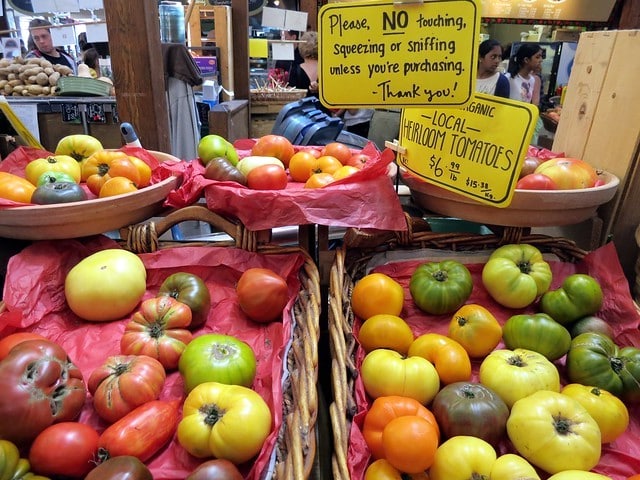
Maybe if basic food tasted better we would not be compelled to doll it up with high-calorie fixin’s. Sadly, food just doesn’t taste as good as it used to, and part of this can be attributed to the methodology of industrial agriculture. The tomato of today is nothing like the tomato of yesteryear. The thing about taste buds is, they get old just like every other part of a person.
There are several other causes for loss of taste and/or smell, and some of them we can’t do much about — allergies; nasal, sinus, or dental problems; head or facial injury; Parkinson’s or Alzheimer’s disease. Sensory loss is a side effect of some medications. The Mayo Clinic says that diminished taste and smell…
[…] might tempt you to use excess salt or sugar on your food to enhance the taste — which could be a problem if you have high blood pressure or diabetes.
Or, we might add, if you are trying to avoid or reduce obesity. With smokers, loss of taste is their own fault, and the more they smoke the worse the problem gets. But smokers are the select group who really have the potential, if not the motivation, to get this taste problem under control.
Just a couple of years ago, a team of researchers discovered that “neither the quantitative impact on taste sensitivity nor the time-course of taste recovery on stopping smoking have been precisely examined.” They wanted to change that.
Nor had anyone looked into how the different regions of the tongue were affected. Some things, however, were known:
Generally, the dietary habits of smokers are characterized by higher intakes of energy (cholesterol, saturated fat and alcohol), and by lower intakes of antioxidant vitamins and fiber (fruits and vegetables).
When you quit smoking, the different areas of the tongue recover at different rates, ranging from two weeks to two months. This does not affect which taste perception (sweet, sour, salt, etc.) returns first, because as we have seen, receptors for all the tastes are distributed throughout the mouth. Compared to a lot of other self-inflicted problems, the recovery time for this one is described as “rapid.”
A fairly reversible disability
Taste receptors are in the mouth to warn the brain not to let toxins any farther into the body. Because we ingest so much crap, most contemporary humans, yes, even non-smokers, have messed-up taste capacity. A diminished sense of taste is counterproductive in an evolutionary sense, because it lessens our chance of survival.
Periodic fasting, or even just keeping things pretty bland for a while, are both excellent ways to restore taste acuity. But the more we abuse our taste buds with weird chemicals the less chance they have to serve us well. And probably, the fatter we will get, because of trying to compensate for the loss.
Your responses and feedback are welcome!
Source: “Is loss of taste and smell normal with aging?,” MayoClinic.org, undated
Source: “Effect of cigarette smoke on gustatory sensitivity, evaluation of the deficit and of the recovery time-course after smoking cessation,” NIH.gov, 02/28/17
Photo credit: Ruth Hartnup on Visualhunt/CC BY

 FAQs and Media Requests:
FAQs and Media Requests: 











